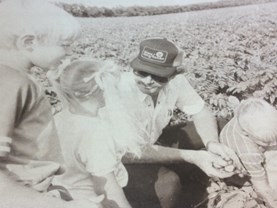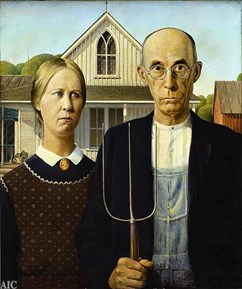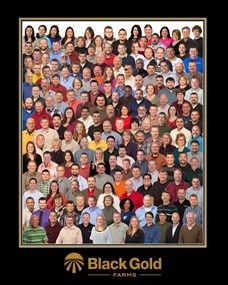The Family Farm
Let's discuss a subject that I believe is one of the most interesting concepts in agriculture - the notion of "The Family Farm". As one who was born into what is commonly known as a Family Farm, was raised by a Family Farmer, retired and is now deeply interested in preserving a Family Farm legacy, I spend maybe more time that I should thinking about this concept. Actually, it is my belief that this Family Farm phenomenon continues to be one of the lynch-pins that has propelled American agriculture into one of the most amazing industries the world has ever known.
The question is, why? Why is this sort of style of business responsible for the tremendous productivity of production agriculture that has been documented over the past two centuries? Why has there been such superb continuous innovation that has incubated on the farm? Why has production agriculture grown as measured by nearly every metric during out lifetimes? Why has the ag supply chain continued to improve not only the science, but the art of production agriculture? I would argue that the answers to these questions just might be connected to the strength of the this concept we call the "Family Farm".
What is so special about a Family Farm?
How can the teenager that was sometimes on the honor roll....sometimes not, twenty years later turn into the president of the local School Board, or chair a national trade association? How can the captain of the high school football team turn into a soccer dad without ever setting foot on a soccer field until his daughter (and maybe his wife) smiled at him and asked him to take his turn behind the wheel or to put in his time as a sideline coach?
I believe there are many lessons that are learned around the Family Farm dinner table, not to mention in the farm shop or in the field everyone knows as the "Rock Farm". These are lessons learned from a dad that, at the time, unbeknown to his son or daughter, was giving life lessons on a daily basis. "Do it right...the first time", was one I distinctly remember, as repeated to me more than once from Dad. A phrase that I have been accused of repeating to my daughter when she was a teenager went something like this: "Nothing good happens after midnight!". Yes, while the culture on our Family Farm was not perfect, in many ways it was certainly memorable.

Statistics show the Family Farm just may be a part of the secret to the tremendous productivity of our system of production agriculture in the US. Not too long ago, when I was in the 6th grade (1960), the average US farmer produced enough food for himself and 26 other people. In 2015, that number has jumped to an amazing 160 mouths fed per US farmer. Even more remarkably, according to the USDA, in 1900, 41% of the US workforce was employed in agriculture. Almost magically, today that number is less that 2%. That is real, measurable productivity. Today, most family farmers may even have indoor plumbing, running water and electricity! Fascinatingly, according to a USDA report using 2012 data, a staggering 97% of the 2.1 million farms in the United States are family-owned operations!
The picture that I have in my mind (which admittedly may be old school) of the old time hard scrabble family farmer is depicted by the very famous American Gothic painting of the farmer and his wife with the pitchfork. How things have changed!

I would argue there is enough value within the "Family Farm" that I believe it should be perpetuated whenever possible. Interestingly, during the 66th session of the United Nations General Assembly, 2014 was formally declared to be the "International Year of Family Farming" (IYFF). It is unfortunate we did not spend more time celebrating the IYFF. But...maybe it is more important to spend time making the Family Farm system even better.
Family Farm and Change
I further believe the Family Farm will continue to change in many ways. The classic Family Farm may not be headed by the patriarch with the pitchfork, the oldest son. or the only son. It just may be ruled by a daughter, a wife, or a granddaughter of the patriarch. The CEO may answer to a board or executive team comprised of not only other members of his or her family (or maybe not), but by (egad) non-family board members. To make things even more mixed up, the farm may be structured such that it may be something other than a sole proprietorship: maybe an LLC, possibly some type of corporation, perhaps a partnership, or conceivably even some even more exotic business structure. Yes, the options are endless. It may even be conceivable that the Family Farm may be managed by non-family specialists...or group of specialists...all the way up to the CEO level.
I believe one of the positives of the Family Farm business structure is the ability to operate a business that manifests itself through a Family Farm culture, established by those that make up the Family Farm, whether they be direct family members or non-family members of upper management. In this instance, I believe the meaning of the the term "Family Farm' is less about the family than it is about the farm business family, whether the entire team is related by blood or not. Oh yes, there might sometimes be an individual state regulation or mandate relating to land ownership, risk relationships or financing covenants that need to be dealt with appropriately. However, even though there may be different sorts of business organizational structures, I believe the most important consequence of a Family Farm structure is being treated like a family member, for everyone linked to the business....vendors, family members, non-family members, associates and customer alike. I believe that all else being equal, because of the bond of the family farm culture, our customers would rather deal with a family business, especially a proven 4th generation legacy Farm Family organization.
Our Family Farm
At Black Gold Farms, we are very blessed to be a Family Farm in many ways. We have family members as well as non-family members which have worked in all levels of our origination for generations. I believe we have a wonderful Family Farm culture with aspects that exemplify themselves in every corner of our business. The aspects of our culture: Values, Transparency, Team, Excellence, Customer, Passion and Innovation are the embodiment of our Family Farm culture. I believe this culture is valuable not only to every Black Gold Farms associate, but to every vendor and customer as well.
As I look back on 50-plus years of involvement in our Family Farm, I know I have been very blessed. Now, more than ever, I see it as my job to do all I can to help our Family Farm prosper for many generations to come. I salute the members of the Family Farm I am involved with...and would like to thank the folks pictured below...our true Black Gold Farms Family.



Share